
Challenge of Tanaka Farm toward “the most delicious food supplier in Japan”
We continue to be a company that can contribute to the local area by
transmitting the excitement of food from Tottori to Japan
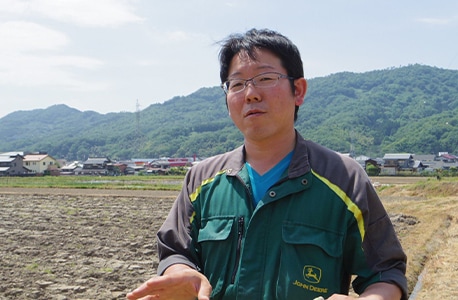
Satoshi Tanaka, CEO of Tanaka Farm Co., Ltd.
1. Making completely domestic locally based compost
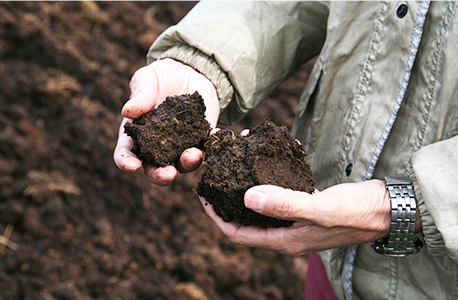
Tanaka Farm is proud of the sweetness, gloss, and texture of its rice and vegetables. A key to produce them is nutritious, high-quality, completely domestic compost. There are three important points for composting, "(1) cowdung," "(2) paddy rice and rice husks," and"(3) fermentation."
Cow dung is obtained from a fattening farm of Tottori Wagyu, which is famous for "Tottori Wagyu Olein 55(*1)". An environment where high-quality cow dung can be stably secured near the farmland is rare even for farmers in Japan. We are both trying to expand sales channels from Tottori to Japan and the world, therefore we can build out this original system.
We do not use paddy rice and rice husks from overseas, but use the ones we have grown. We believe that fully cyclical utilization of products we have grown with responsibil-ity is an important initiative for future agricul-ture that values consideration for the envi-ronment.
Also, an important thing is the fermentation period. We aim for complete fermentation over a period of more than a year with regu-lar stirring (to mix together).
Unique way of making compost that Tanaka Farm has been working on for more than half a century. We have achieved chemical ferti-lizer-free rice cultivation! We will also chal-lenge chemical fertilizer-free vegetable culti-vation. (*2)
(*1)Tottori Wagyu Olein 55: Tottori has been a good Japanese beef producing area since the Edo period. It is known that Tottori pedi-gree has a wealth of "oleic acid" which is the main component of olive oil. Oleic acid is said to be related to the good melting of beef in the mouth. So, from among Tottori Wagyu, Wagyu containing 55% or more of oleic acid is branded as "Tottori Wagyu Olein 55".
Source:Website of Department of Commerce, Indus-try and Labor Department and Market De-velopment Bureau, Department of Agricul-ture, Forestry and Fisheries in Tottori
(*2)Currently, we use the minimum required chemical fertilizer only when planting white leak seedlings.
2. Our original method “30-cm deep cultivation” aiming for complete re-versal and plow-in
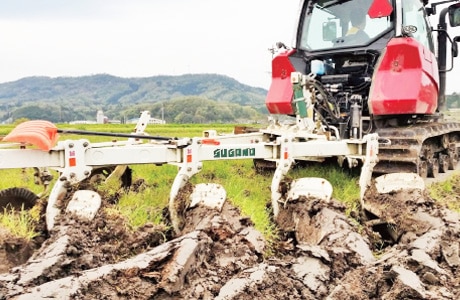
At Tanaka Farm, we adopt "30-cm deep culti-vation", which is the basis of farming. As the soil near the surface of the land becomes poor nutrition, digging deeply and replacing poor soil with the lower soil can provide fallow pe-riod to store nourishment again. At the same time, 30-cm deep cultivation maximizes the potential of the land. “A plow" is required to achieve 30-m deep cultivation. Using a plow makes it easier to grow roots, and reversal and plow-in improve soil fertility.
In order to realize 30-cm deep cultivation, it is necessary to purchase a large tractor that op-erates efficiently and to improve the personnel system. When cultivating 30-cm deep with conventional tractors, it is troublesome and inefficient because the tractors get stuck in the mud. Therefore, many farmers in Japan do not do that. We will continue to challenge the im-portant 30-cm deep cultivation in order to pursue deliciousness even if it is said to be troublesome.
3. Careful selection of high-quality seed rice
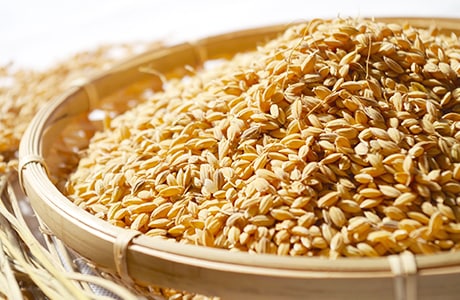
We grow rice by ourselves from seedlings on our farm. In particular, all Koshihikari seed rice is cultivated in-house. We carefully re-move immature grains or grains damaged by insects, leave unharmed grains and select good seed rice with full contents by a sorting meth-od using salt water. Since we use only carefully selected seed rice for seedlings, the seedlings grow into strong.
4. Making seedlings with strong roots in pots
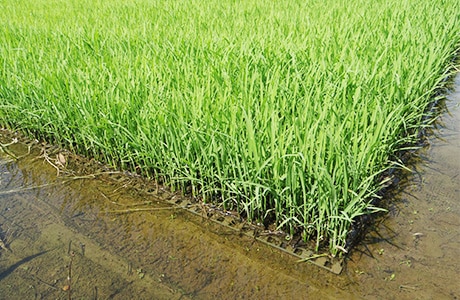
In general, rice seedlings are often grown by a method using raising seedling boxes. This method supports mechanical planting. On the other hand, at Tanaka Farm, we have been rais-ing seedlings one by one for more than 20 years by a method using raising pots in order to grow strong seedlings. It requires great care and time, but the roots fasten deep and the seedlings become strong.
Also, in order to bring the environment closer to that after planting, we grow seedlings in rice fields and do not use raising seedling boxes. The seedlings grow by absorbing plenty of nu-trients and minerals from the abundant com-post in the rice fields, so they become high-quality seedlings. This is Tanaka Farm's policy to carefully and strongly grow each seedling, even if it takes cost and effort.
5. Uniformly drying over time to keep rice delicious after harvesting
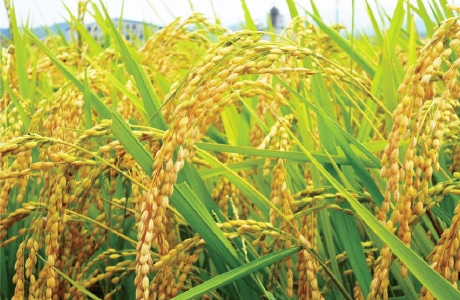
Rice just after harvested has about 25% of high moisture content. If the rice is stored directly, fermentation starts. So, it is necessary to dry it quickly to have about 15% of moisture con-tent. Drying quickly becomes a burden on rice and the rice may be easily cracked.
Therefore, at Tanaka Farm, we take a two-step drying method; first, drying with wind without applying heat, and then drying by a boiler. We create air-blow toward harvested rice for 10 to 12 hours to adjust uniform mois-ture content, and then dry the rice with warm air by using a boiler for at least 1 day.
We can dry harvested rice quickly in about 6 hours to reduce cost. However, the method we take is less stressful to rice and the rice dried carefully than usual maintains the original taste same as sun-dried rice.
6. "Year-round paddy rice storage" achieved in Tottori
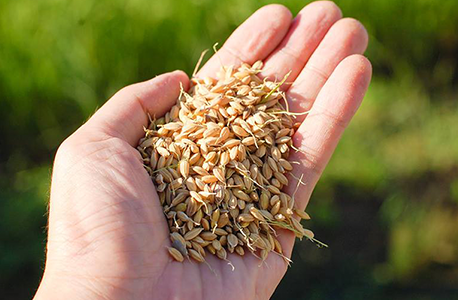
In order to deliver delicious rice from farm to table throughout the year, we take our original paddy rice storage method to keep paddy rice in the living state . Usually, many rice farmers remove rice husks after harvesting in autumn. The original storage method prevents the dry-ness and oxidation of rice that cause an off taste and keeps fresh taste.
Tanaka Farm is located in an interior region between the Sea of Japan and 1500-m Hyono-sen and about 10 km from the coast, and the climate is the-Sea-of-Japan-specific and humid throughout the year. We, of course, have our own rice milling facilities in the farm, but the power of nature helps us store our rice with-out using expensive storage facilities that re-quires temperature and humidity control.
We will continue to make an attempt at our original storage method in order to have peo-ple enjoy the deliciousness and freshness of our rice any time even facing an environment of global climate change problems.
7. "Reform of working practices" to bring up the next-generation farm-ers
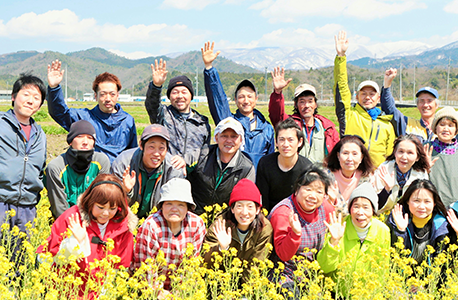
Satoshi Tanaka, the second CEO of Tanaka Farm, will make an attempt at reform of work-ing practices for farmers as a responsibility to the 20 employees and the partner companies supporting us.
Agriculture is a job that depends on the weath-er and the season. It is important to take care of farmlands 24 hours a day, 365 days a year, but in other words, it is a poor work environ-ment that takes no account of overtime hours. Tottori is a front-line region facing an aging society with a declining birth rate and indus-trial recession. Agriculture must continue as a major industry in Japan, not just in Tottori. To that end, it is important to improve this poor working environment.
At Tanaka Farm, we subdivide tasks each staff is in charge of into smaller ones and try to bring in weekends and holidays off. Working practices of farmers must be changed as life-style becomes increasingly diversified and people think much of their personal life.
We try reform of working practices to achieve next-generation-farmer- based agricultural environments where next-generation farmers engage in agriculture free from anxiety while we do agricultural diversification (ex. pro-cessed food manufacturing and direct market-ing) to generate various revenue sources aim-ing for continuous and stable management.
8. Special cultivation system aiming for chemical-free agriculture
We want many people to experience the ex-citement of food by delivering the true taste of agricultural products. To that end, Tanaka Farm is engaged in agriculture that incorpo-rates the latest Internet of Things (IoT) tech-nology.
For example, agricultural drones, AIs and ro-bots. We really want to grow agricultural products without using herbicides and pre-servatives. Also, we want to eradicate weeds and exterminate pests all by hand without us-ing agricultural chemicals. However, as long as we must deliver agricultural products in a sta-ble manner, it is still necessary to use a mini-mum amount of agricultural chemicals. Utiliza-tion of the latest technology is indispensable to achieve chemical-free agriculture as much as possible.
Finally, in order to continue to deliver deli-cious safe and fresh rice and vegetables to eve-ryone in a stable manner, Tanaka Farm will continue to take on challenges without being restricted by tradition.
━ History ━
| 1971 | Started agriculture (hog raising) start |
|---|---|
| 1976 | Farmland consolidation |
| 1980 | Company foundation |
| 1993 | Implemented cultiva-tion method not using chemical fertilizers and agricultural chem-icals to the best of our ability |
| 1996 | Corporate registra-tion as Tanaka Farm Co., Ltd. |
| 2004 | Registration of paddy-field rice as a specially cultivated agricultural product in Tottori |
| 2006 | Certified as an Eco-Farmer (environmen-tally friendly farmer) |
| 2007 | Registration of beans and white leaks as specially cultivated agricultural products in Tottori |
| 2014 | Increased demand of sake breweries and expanded cropping of rice for sake (Yamada Nishiki) |
━ Company overview of manufacturer ━
| Company name | Tanaka Farm Co., Ltd. |
|---|---|
| Founding date | In January 1996 |
| Representative | Satoshi Tanaka, CEO |
| Address | 442, Orisaka, Yazu-Cho, Yazu-Gun,Tottori, 680-0426 Japan |
| TEL/FAX | TEL: +81-858-72-2826/FAX:+81-858-72- 2827 |
| Business hours | From 8:30 to 17:30 (closed on Sundays and public holidays) |
━ Company over-view of sales business trustee ━
| Company name | Double Knot Co., Ltd. |
|---|---|
| General operation manager | Tsutomu Takabayashi, CEO |
| Address | Hayabusa Lab., 154-2, Mizukinaka, Yazu-Cho, Yazu-Gun, Tottori 680-0404, Japan |
| TEL | +81-50-3198-9749 |
| Business hours | From 9:00 to 17:00 (closed on Saturdays, Sundays and public holidays) |
